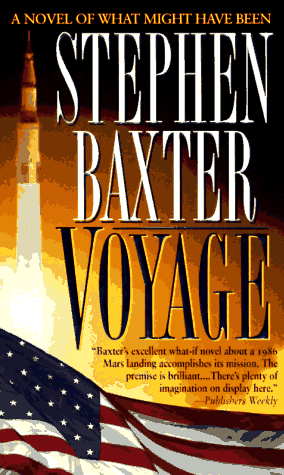 Science Fiction and Fantasy Editor's Recommended Book, 02/01/97:
Science Fiction and Fantasy Editor's Recommended Book, 02/01/97:Kennedy survived. Like many alternate history stories, that's the premise of Stephen Baxter's Voyage. But in Baxter's version of the past, that one altered fact is the propellant that drives humanity into space, beyond the primitive lunar landings of the 1960s. Spurred by a JFK who champions space flight and a Nixon administration that backs NASA, humans reach Mars in 1986. But this is a tragic tale as well as a triumphant one, for Baxter's relentless realism chronicles the perils of extended space flight as well as its glamorous achievements, making for a gritty, true-to-life story.
Synopsis 1:
The epic saga of America's unrealized potential had Kennedy survived to
continue the country's space efforts, ultimately paving the way for
American astronauts to land on Mars in 1986, this novel is more
gripping than fact, more plausible than fiction.
Synopsis 2:
More gripping than fact, more plausible than fiction. Voyage
interweaves historical figures from Neil Armstrong to Ronald Reagan
with unforgettable fictional characters that only a first-class
novelist could bring to life. It's all here, in a high-tech thriller
that combines the hard ring of science with the soaring drama of human
endeavor.
From the Publisher :
This extraordinary novel, as much fact as fiction, tells of a recent past that was almost
our own - a past in which President Kennedy, though wounded, lived to
set in motion the next great project of NASA; a past in which the 1969
moon landing was followed by an even bolder triumph in 1986, when three
American astronauts - one of them a woman - stepped onto the planet
Mars.
Voyage is the epic saga of America's might-have-been-a powerful, sweeping novel imaginatively created from true lives and real events. NASA, the Saturn rocket, and historical figures from Neil Armstrong to Ronald Reagan are interwoven with unforgettable characters that only a world class novelist could bring to life: Dana, the Nazi camp survivor who achieves the dream of his hated masters; Gershon,the Vietnam fighter jock determined to be the first African American to land on another planet; Lee, the small scale aerospace contractor with a big dream; Priest, who gives his life so that others might live to walk on Mars. And most memorable of all, Natalie York, the brilliant geologist/astronaut who is her own worst enemy, and best friend; a passionate woman who risks a career and a life long love for the chance to run her fingers through the soil of another world. Voyage is a big book, about big gambles and big dreams. Award-winning novelist Stephen Baxter tells it authentically, as it might have, as it should have happened. The heroics and the theatrics, the humor and the heartbreak as families struggle to stay together; the conflicts between the engineers and the politicians, the bureaucrats and the fly boys -- it's all in here, in a remarkable literary performance that combines the hard ring of fact with the high drama of human endeavor.
Voyage is a singular publishing event , as revealing as The Right Stuff, as sweeping as Michener's Space, as gripping as Apollo 13. A complex novel with the depth of history, it reaches for truths that only literature can achieve. By the time you have stepped with Natalie York onto the windswept sands of Mars, you will know the men and women of Voyage as intimately as your own family.You will understand the furies that drove them, and the dream that beckoned them. And you will mourn for the awesome beauty of the triumph that might have been.
Customer Comments
rodvik@hotmail.com from LA, USA , 10/07/97, rating=8:
A great tale marred by political correctness
After enjoying baxters earlier works I greatly looked forward to
"Voyage" and I was not dissapointed. The Baxter science is as "hard" as
ever and the guy simply has a flair for capturing the epic. On the
downside Baxter has fallen into the political correctness trap. The
mars crew consists of a black man, a white woman and a white man simply
absurd given the actual makeup of the astronauts at the time. Also
Baxter cant help taking away from the Germans any credit for the mars
mission by giving an ex "slave labourer" to idea for how to get to mars
effeciently. These cringeworthy moments aside Baxter tells an excellent
tale. I look forward to "Titan".
FKiesche@aol.com , 07/30/97, rating=10:
Still the best book--SF or otherwise--that I've read in 1997
Baxter's VOYAGE is a history of the space program from the first US
landing on the moon until the US mission to Mars in 1984. Wait a
minute--you say--we **never** went to Mars! Yes, that's correct. As
with Alan Steele's THE TRANQUILITY ALTERNATIVE and many other fine SF
novels, Baxter postulates a slightly different--but very realistic
alternate history. John F. Kennedy survives the bullet meant for him
and is present in the White House when Richard M. Nixon speaks to the
astronauts on the Moon. Kennedy chimes in and expresses a desire that
the US go to Mars..and Nixon goes along with him. The novel is a very
realistic (gritty) depiction of that journey to Mars. Like Wolfe's THE
RIGHT STUFF, Baxter paints a sometimes less-than-glamourless view of
the aerospace industry and NASA. The journey to Mars breaks down into
factions--those that want to do it for the glory, those who want
science, those who want to protect their turf and projects. The
characters are realistic. The science is realistic. The alternate
history is very plausible. Some parts of the story will thrill you.
Some parts will break your heart. As I said in my one-liner, the best
book--science fiction or otherwise--that I've read in 1997 (and to
date, July 1997, I've read about 75 or so this year!). Fred Kiesche
(FKiesche@aol.com)
nadmec@rohmhaas.com , 03/07/97, rating=8:
Everything you want to know about "why we should be on mars"
Even the details of going to the bathroom ....in a trans-Mars trip are
touched on... The "what if book" of Manned space travel...i really
endorse this book..A novel that reads like a history primer... Mark
pwl@sys.uea.ac.uk , 01/18/97, rating=9:
It really could have happened
I can remember, as a child of 10 or so, watching the ghostly pictures
on television of Armstrong and Aldrin walking on the moon. I was hooked
on the adventure and became an avid Apollo watcher until December '72
when the last mission flew. There was a lot of speculation that the
Americans would follow up their moon triumph with a push at the big one
and go to Mars. Despite the good reasons, I was always disappointed
that it didn't happen. I'm sure many others were too and, especially if
you are one of them, it is therefore with some excitement that you
should approach this book. Stephen Baxter has created a wonderful
'could have been' story of the first manned flight to Mars in the mid
1980s. It is all so plausible - and there are even some real life
characters. Anyone who has read Andrew Chaikin's "A man on the moon -
the voyages of the Apollo astronauts" or Henry Cooper's "Thirteen: The
Apollo flight that failed" will find resonances from these factual
accounts in Baxter's story. The characters are very well crafted and,
after reading the book, you will find it difficult to separate Stone,
York and Gershon, Baxter's astronauts, from Armstrong, Conrad, Schmitt
and all the others who really did fly in the great adventure. Read this
book - a very believable and gripping tale.
From Kirkus Reviews , 12/01/96:
Tom Clancy meets Tom Wolfe as newcomer Baxter crams a shifting cast of
dozens into this obsessively researched revision of the American space
program, the payoff for which is a manned landing on Mars. Back in the
late '60s, with Kennedy dead and Nixon in the White House, the
country's appetite for interplanetary exploration waned. The next step
after the Apollo missions was a voyage to Mars, but NASA was pulled
back. Baxter imagines what might have happened if Kennedy had lived and
cajoled the nation into visiting the Red Planet. He anchors his
relentlessly propulsive narrative on three characters: Gregory Dana, a
scientist and concentration camp survivor who detests the German rocket
scientists' affection for Big Science, preferring a more elegant (and
less costly) route to Mars; Ralph Gershon, an African-American
astronaut on the Mars missions; and Natalie York, a geologist who
escapes two importunate lovers--one a nuclear rocket scientist, the
other an astronaut--to make her awkward way Marsward. The story deftly
incorporates the history of the actual Apollo missions, making the
mission to Mars seem a natural outgrowth of the moon landings. Indeed,
the mission ultimately ends up looking a lot like the Moon program:
York, Gershon, and the third astronaut, mission commander Phil Stone,
are stuffed into a rickety can for the long journey, then blasted into
space. The author does a nice job of focusing on his three astronauts'
individual experiences of the trip. Perhaps more dazzling than the
voyage, though, is the imagined high tech that gets Americans to Mars.
Baxter adroitly passes off science fiction as (detailed) science fact.
Technophiles will find this endlessly appealing; sci-fi devotees will
appreciate the sly Star Trek and 2001 references. For a little tragic
juice, there's even a fair emulation of the Apollo 13 accident, though
with decidedly different results. A wonderful, patriotic tale of lost
possibility. Calling Ron Howard.
Back to the books page
Back to the links page
